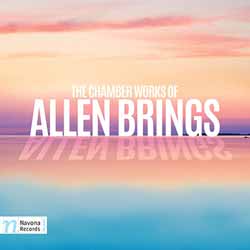|
Click here to return to the main site. Classical Music Review
This triple re-release contains a collection of works for small ensembles comprised of a diverse selection of instruments. Along with two albums from Allen Brings, this reissue includes a compilation titled Contra-Punctus (1994). Brings’ Duos, Duologues,, and a Duette (2006) stays true to its name with a set of duets for a mix of performers, including several different violinists, pianists, cellists, violists, clarinetists, flutists, and oboists. On Music Da Camera (1997), the composer varies his performer pairings to include solo performers and trios for a series of fantasy-themed compositions... Both a composer and a pianist, Allen Brings has twice served as chairman of the eastern region of the American Society of University Composers and currently serves as vice president of Connecticut Composers. He has received an ASCAP Award every year since 1975. Additionally, Brings has taught at a number of schools, and holds professor emeritus status at his alma mater, the Aaron Copland School of Music at Queens College of the City University of New York, where he was coordinator of the theory and ear training program. He is now a director of the Weston Music Center and School of the Performing Arts in Connecticut, where he teaches piano and theory. Sounds promising, right? From such a prestigious scholar one would be expecting a remarkable trio of albums here. And to some this will be the case. However, a word of warning. If you're NOT a fan of modern classical music that breaks the boundaries and challenges the genre's conventions, then you're unlikely to get much out of The Chamber Works Of Allen Brings. However, if you like to be challenged, are looking for something new that doesn't follow standard music conventions, then you'll find a lot to enjoy here. Personally, I really didn't get on with this release. I'm set in my ways and like classical music to offer something for my soul. Melancholic, uplifting, packed with energy... I don't care, as long as it offers something that my senses can enjoy. For me, the trouble with albums like this is that they attack my senses, but not in a positive aspect. When listening to this I wanted to clap my hands over my ears. Some parts see instruments clash so badly that it made me wince... Now I know this is the idea, but I didn't find the experience very rewarding... just intensely annoying. Do you remember as a kid, at school, you and a few friends had somehow managed to turn up to music class a little earlier than intended. The teacher and rest of the class where nowhere to be seen, but the side room that housed all the instruments was unlocked. Do you remember all going in and picking up random instruments, trying to get them to work, before moving on to others? Well, on occasion this is how I felt listening to this album. Tracks like 'Duo Concertante' have moments where it feels like the musicians are just p*ssing about with each others instruments. Now, the reason I'm waffling is that this is one of the few albums I've been unable to give as much attention to as normal. I usually listen to each album once, put it aside for a few days and then play it again on and off for a couple of weeks. With this release I only managed to listen to it a handful of times before I realised it was affecting my mood. Putting it bluntly, it annoyed the sh*t out of me. I like to be constructive in my criticism, but I'm finding that challenging on this occasion. As a work of art on how to subvert the beauty that can be created from classical music, this is faultless. But, as an album to listen to and enjoy aesthetically... good luck with that. 2 Darren Rea Buy this item online
|
|---|


